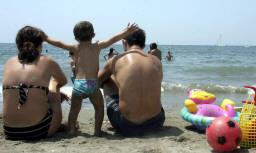Italy is the best place in the world to be for children but not for their mothers, according to the 2008 Mother's Day Report Card put out by the Save the Children charity organization.
The annual ranking evaluates 146 countries to determine which are best for not only mothers and children, but also for women in general.
While first for children, for the second year in a row, Italy was 19th for mothers and 24th for women.
Scandinavia was in general the best place for mothers and women with Sweden first in both categories while Norway was second for mothers and fifth for women, Iceland was third for both and Denmark was respectively fifth and sixth, after New Zeland which was fourth for mothers and second for women.
After Italy, Germany was the best place for children, followed respectively by France, Sweden and Belgium.
In the mothers' category, Italy found itself trailing such countries as Estonia, Greece and most of the northern European countries.
Although behind Hungary, Spain and Greece in the women's category, Italy was a better place to live for women than Austria, Japan and Luxembourg.
In presenting its Report Card on Tuesday, Save the Children pointed out that conditions for mothers and their children in countries at the bottom of the index were bleak.
On average, one in 21 mothers will die in her lifetime from pregnancy-related causes; more than one child in six dies before their fifth birthday; roughly one in three suffers from malnutrition; and only three girls for every four boys are enrolled in primary school.
''A mother's well-being is connected to her children's well-being,'' said Charles MacCormack, president and CEO of Save the Children. ''It is not surprising, then, that in the worst places to be a mom, both women and children die young''.
''There is a great divide between the status of mothers' health and well-being in rich and poor countries,'' added MacCormack, referring to the Mother's Index rankings.
''In rich nations, where women have access to basic health care, giving birth is usually a time of joy. But in poor countries, where there is little or no access to skilled health workers, it is typically tragic. Every woman in the ten worst countries is likely to suffer the unbearable loss of a child in her lifetime,'' she said.
In drawing up its rankings, Save the Children took into consideration: lifetime risk of maternal mortality, percentage of women using modern contraception, skilled attendant at delivery, female life expectancy, expected number of years of formal schooling for females, ratio of estimated female-to-male earned income, maternity leave benefits and participation of women in national government,
Others considerations included under-five mortality rate, percentage of children under age 5 moderately or severely underweight, school enrollment ratios, ratio of girls to boys enrolled in primary school and percentage of population with access to safe water.









